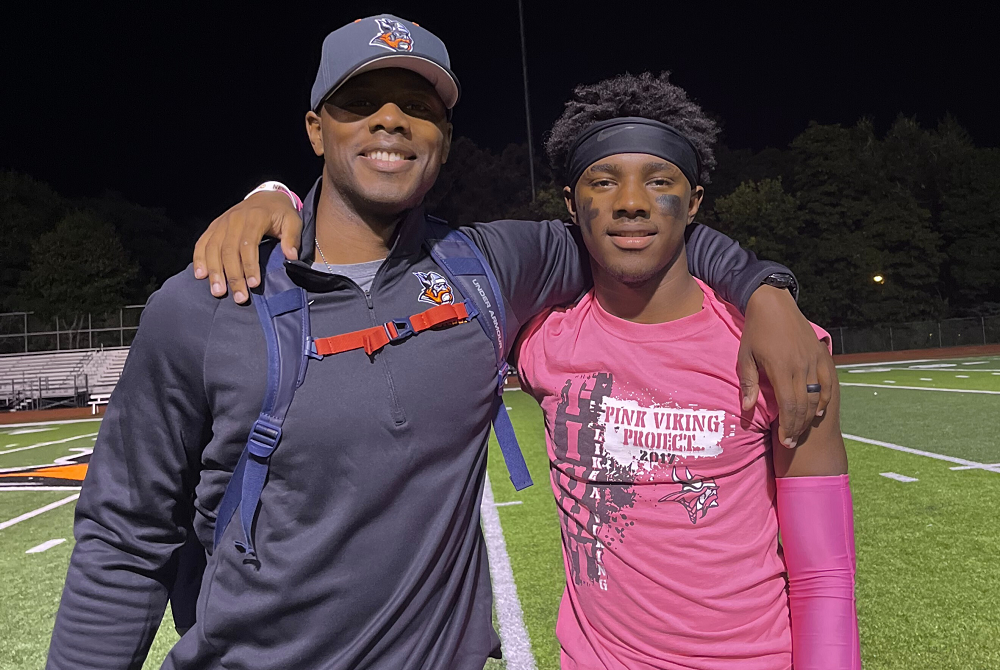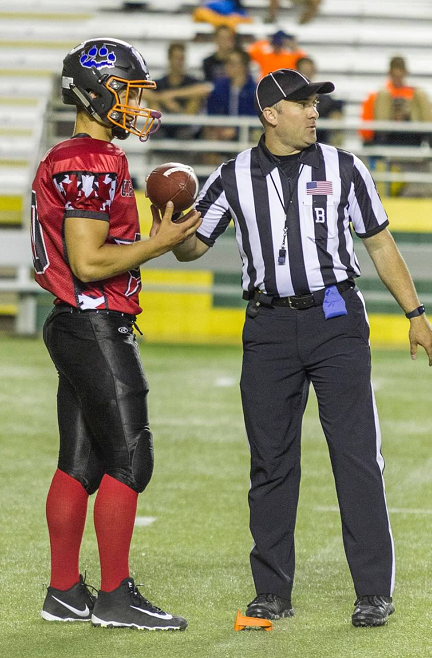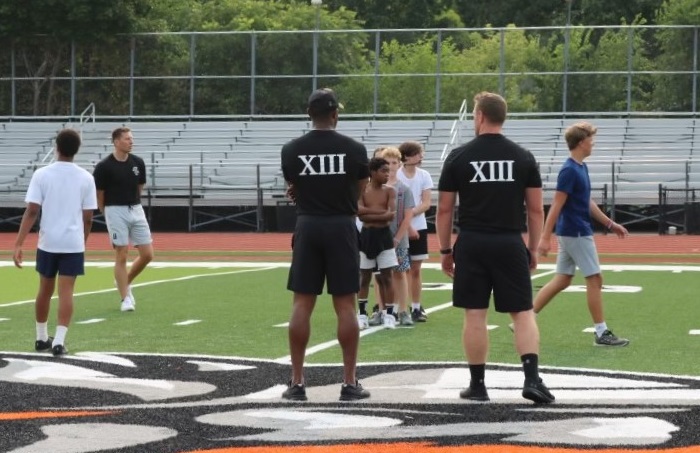
MHSA(Q&)A: Official Lyle Berry
May 7, 2012
By Geoff Kimmerly
Second Half editor
 Rockford’s Lyle Berry Berry received the MHSAA’s Vern L. Norris Award on Saturday for his contributions to officiating, mentoring and officials’ education.
Rockford’s Lyle Berry Berry received the MHSAA’s Vern L. Norris Award on Saturday for his contributions to officiating, mentoring and officials’ education.
An educator and official beginning in 1960, he also has officiated cross country and basketball, and has been a long-time member of both the West Michigan Officials Association and the Association of Track Officials of Michigan – having served both as president and rules chairman.
Berry also coached football for 36 years, with 32 at the high school level at Tawas, Farwell, Wayland and Wyoming Godwin Heights before spending four seasons as an assistant at Grand Rapids Community College. He was a head coach for 27 of those high school seasons, and was inducted into the Michigan High School Football Coaches Association Hall of Fame in 1988 and the Michigan High School Coaches Association Hall of Fame in 2008.
What keeps you coming back?
Just working with the kids, basically. There was a time, a turning point, when I did not know if it was as ego thing or an obsession. At some point, it was just a thing I wanted to do. It became so much fun, I didn't want to quit.
What was that turning point?
Ten or 12 years in officiating, I was in the process of building a career and wanting to take the next step each time. I got to the point where I was doing varsity basketball, and I got established there and wanted to move to the college ranks. And I did that. But 12 or 13 year in, there was a Grand Rapids City League game that went to double overtime. The two teams were undefeated at the halfway point (of the season), and it was a tight ballgame. After the game, we used to stand in front of the scoring table waiting for the books to get finalized. I looked over and saw the coach from the losing team talking to his kids, and the next thing we know, a few of them are coming over toward me. I’m thinking “Oh boy; here we go.” But the kids came up and said their coach wanted to make sure (they) congratulated (us) on a job well done. And the next thing out of their mouths was, “Wow, was that a great game?” And that’s where they left it. They said thanks and left. I thought I would’ve worked that night for nothing. And it just went from there.
What do you enjoy most about officiating?
It’s being with the kids more than anything. I do college track, high school track and junior high track, and some of the most fun situations are with the junior high kids. … Those kids either don’t know what’s going on, or keep you hopping, keep you on your toes. Being around them, it helps keep me a little young.”
You’ve been a teacher, coach and official. Are there similarities among the three?
All three blend together really well. You get to look at coaching as having the ability to teach kids how to have fun, and officiating you look at as watching kids have fun. Those two things go hand in hand. And teaching, of course; I was in the physical education field and I’d see all these kids and athletes who I’d eventually be coaching. Being around them all the time was just a bonus.
Is recruiting officials tougher now than it was in the past?
It’s a little bit tougher now. At the banquet the other night, there were only seven or eight 50-year people. Ten or 15 years ago, we didn’t even have a 50-yard award. And when that came in I thought it would be great because there would be a lot in that class. Last year I got my 50, and there were only 12 or 13 of us. The 40-45 (year) class had only 20 or 25. It just seems like the numbers are dwindling. You don’t see the commitment to carry on.
You see the same thing in coaching. I coached football 36 years, and you don’t see that. You see coaches get out after 10 or 12 years, burned out. I don’t know what the situation is causing that, but it’s definitely getting hard.
What advice do you give to young officials?
At this point in time, I’m working in the O-K Conference as a basketball observer of officials. Over the last six or seven years, I’d gotten 10-15 young guys. I like to go watch the JV, the freshmen guys, talk to them at halftime or after the game, like having a mini clinic with them. I encourage them to go. Last year I saw a dozen of those guys move on to the varsity ranks. Basically, I just tell them just to stay with it. And when the opportunity comes, you’ve got to jump in with both feet.
PHOTO: (Below) Lyle Berry speaks to the audience during Saturday's Officials’ Awards & Alumni Banquet at the Kellogg Center in East Lansing.


From MSP Post to Postgame: Lieutenants Return to the (Football) Field
September 27, 2023
While fans are settling into another season, Michigan State Police Lt. Tedric Gibbs has been fully immersed in football for months.
The Jackson Post’s assistant post commander serves as assistant coach for Jackson High School’s varsity football team and for the team at Parkside Middle School.
“I started coaching when my older son was in youth sports, as a way to do something together that we both love,” Gibbs said. “My younger son followed the same path, so I joined his team too. I grew up in Jackson and am grateful to be able to serve my hometown from the sidelines and at our post.”
 Some 400 miles north, Lt. Mark Giannunzio is also a familiar face in and on the field. The MSP Negaunee Post assistant post commander and Eighth District public information officer enforces the rules of the game as a high school and college football official, the latter for the Great Lakes Intercollegiate Athletic Conference.
Some 400 miles north, Lt. Mark Giannunzio is also a familiar face in and on the field. The MSP Negaunee Post assistant post commander and Eighth District public information officer enforces the rules of the game as a high school and college football official, the latter for the Great Lakes Intercollegiate Athletic Conference.
“I started at the high school level to stay involved in athletics and make authentic connections in the community,” Giannunzio said. “It’s rewarding to help teach the game and share knowledge of the rules. I currently have a full 11-game schedule in the GLIAC Division II college conference, with high school games interspersed during the year.”
The correlation among coaching, officiating and policing translates.
“With my fellow troopers, I want to inspire, motivate and encourage to get the most out of them,” Gibbs said. “I take the same approach with my players to figure out what they need from me, as their designated leader, to be as successful as they can. In both capacities, I do the work alongside them. We do it together.”
This approach is especially important when tough times surface. Lieutenant Gibbs’ high school team experienced tragedy right before its first game when a player died in a car crash.
“We focused on adversity,” said Gibbs, who was in a unique position to talk from a police perspective too. “It’s a benefit to have that insight and background and share it with what they can control – make good decisions and wear your seatbelt.”
Lieutenant Gibbs incorporates his coworkers when he can, like during spring conditioning when fellow troopers join him and his players, helping all involved to make new connections and build strong bonds between the students and officers.
 “One of the most important attributes in both careers is communication,” Giannunzio said. “Communication can make or break an official and a police officer. Much like selling a citation to a motorist, I need to be able to sell the penalty in a calm and professional manner. Demeanor and attitude go together on both the football field and when we are out patrolling in the Blue Goose.”
“One of the most important attributes in both careers is communication,” Giannunzio said. “Communication can make or break an official and a police officer. Much like selling a citation to a motorist, I need to be able to sell the penalty in a calm and professional manner. Demeanor and attitude go together on both the football field and when we are out patrolling in the Blue Goose.”
Treating everyone with dignity and respect is something Lieutenants Gibbs and Giannunzio commit to as members of a modern police agency and in their areas of expertise on the football field.
“Both roles afford so many opportunities to develop culture and cultivate teamwork,” Gibbs said. “The best part is watching others flourish and playing a part in their growth.”
PHOTOS (Top) Michigan State Police Lt. Tedric Gibbs, left, serves as an assistant football coach for the Jackson High varsity. (Middle) Lt. Mark Giannunzio officiates at the high school and college levels. (Below) Gibbs also coaches at Jackson Parkside Middle School. (Photos provided by the Michigan State Police.)

